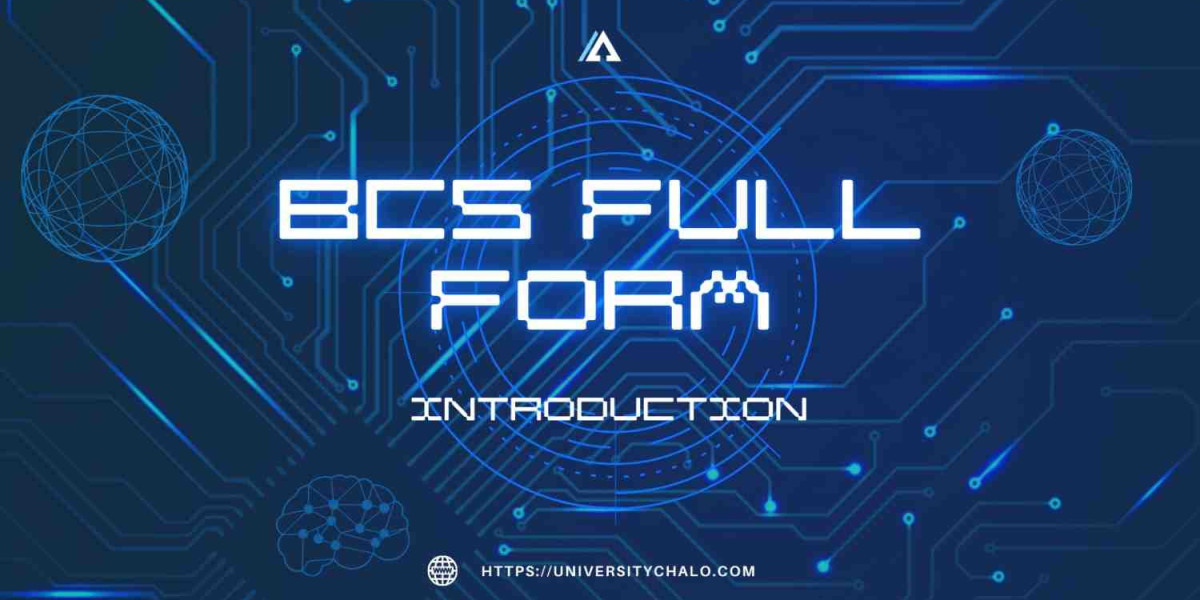Are you interested in pursuing a career in the world of computer science? A Bachelor of Computer Science (BCS) program might be just the path for you. This comprehensive guide will walk you through the essentials of what a BCS course entails, its full form, the advantages of pursuing it, and what to expect in your academic journey.
What is BCS?
Before diving into the specifics, let’s start by understanding the BCS full form. BCS stands for Bachelor of Computer Science. It is a specialized undergraduate degree that focuses on the study of computer systems, software development, programming, data structures, algorithms, and much more. The BCS course prepares students for various roles in the tech industry, which has become one of the fastest-growing sectors worldwide.
Key Features of the BCS Program
The Bachelor of Computer Science program is designed to provide students with a strong foundation in both theoretical and practical aspects of computing. The curriculum generally covers a wide range of subjects related to computing, including but not limited to:
- Programming Languages: Students are taught various programming languages such as Java, Python, C++, and others.
- Software Engineering: Focus on the design, development, and maintenance of software systems.
- Database Management: Students learn about databases, how to manage them, and how to manipulate large sets of data.
- Computer Networks: This subject teaches about networking principles, protocols, and security.
- Data Structures and Algorithms: These are core components of any computer science program, providing the tools to solve complex problems.
- Artificial Intelligence and Machine Learning: Students gain exposure to cutting-edge technologies in AI and ML.
- Operating Systems: Understanding how operating systems work is essential for any computer science student.
Duration of the BCS Program
The BCS program typically spans 3 to 4 years, depending on the educational institution and the country. It is divided into semesters, with each semester dedicated to specific subjects and hands-on training. This duration ensures that students have enough time to master the skills and concepts required to excel in the field of computer science.
Admission Requirements
To pursue a Bachelor of Computer Science, candidates must meet certain eligibility criteria. These requirements vary from one institution to another, but generally include:
- A high school diploma or its equivalent, with a strong emphasis on subjects such as mathematics and science.
- Some institutions may require candidates to pass an entrance exam or provide standardized test scores such as SAT or ACT.
- Proficiency in the English language is essential, especially in countries where English is the medium of instruction.
Skills Acquired During the BCS Course
The BCS course not only focuses on theoretical knowledge but also emphasizes the development of practical skills that are necessary for a successful career in technology. Some of the key skills you will acquire include:
- Problem-Solving Skills: Students learn how to approach and solve complex computational problems through logical thinking.
- Programming Skills: Proficiency in various programming languages such as Java, Python, and C++ is developed.
- Software Development: The course helps students understand how to design, develop, and maintain software systems.
- Critical Thinking: A key component of the BCS program, critical thinking is nurtured to help students analyze problems and develop solutions.
- Teamwork and Communication: The BCS program often includes group projects that help students work effectively in teams and improve their communication skills.
- Research and Analytical Skills: These are essential for anyone looking to innovate or advance in the field of computer science.
Career Opportunities After BCS
Upon completion of a BCS program, a wide array of career opportunities opens up. The technology sector offers jobs that require the skills and knowledge developed during the course. Some of the most common career paths for BCS graduates include:
- Software Developer/Engineer: This is one of the most popular roles for BCS graduates, where they design and develop software applications.
- Data Scientist/Analyst: Using data to uncover insights and solve business problems is a crucial role that has seen a surge in demand in recent years.
- Network Administrator: Managing computer networks and ensuring their proper functioning is another essential job role in the tech industry.
- Cybersecurity Specialist: As businesses continue to rely on digital systems, the demand for professionals who can secure these systems from cyber threats continues to grow.
- Artificial Intelligence Engineer: AI is transforming various industries, and AI engineers are at the forefront of this revolution.
The possibilities are endless, as nearly every industry now requires skilled professionals who understand computer systems and software development.
Advantages of Pursuing a BCS Program
Choosing to pursue a Bachelor of Computer Science offers numerous advantages. Some of these include:
- High Demand for Tech Professionals: The demand for skilled tech professionals continues to rise, making it easier for BCS graduates to find employment.
- Competitive Salary: Professionals in the tech industry often enjoy high salaries, especially as they gain experience and specialize in advanced fields like AI or cybersecurity.
- Job Security: With the growing reliance on technology, computer science professionals enjoy high job security.
- Wide Career Options: A BCS degree opens doors to a broad range of career paths, ensuring that graduates have plenty of options to explore.
- Opportunity to Work in Innovative Fields: Computer science is at the heart of innovation. By pursuing a BCS program, you position yourself to contribute to groundbreaking technological advancements.
Challenges of the BCS Program
While the BCS course offers many benefits, it’s important to consider some challenges:
- Rigorous Coursework: The BCS program can be demanding, with long hours of study, programming practice, and project work.
- Rapidly Evolving Field: The world of technology is always changing. To stay relevant, BCS graduates must commit to continuous learning and skill enhancement.
- High Expectations: Employers expect high proficiency in programming and problem-solving from computer science graduates. This can create pressure on students to perform well during their studies.
How to Succeed in a BCS Program
Succeeding in a Bachelor of Computer Science program requires dedication, hard work, and a strategic approach. Here are some tips to help you excel:
- Practice Programming Regularly: Programming is a skill that improves with practice. Make it a habit to write code and experiment with different projects.
- Participate in Projects: Hands-on experience is invaluable. Join hackathons or work on personal projects to apply what you’ve learned in the classroom.
- Stay Updated: Technology is ever-evolving. Keep up with the latest trends in the field by reading tech blogs, attending webinars, and participating in online forums.
- Ask for Help: Don’t hesitate to reach out to professors, tutors, or fellow students when you’re struggling with a concept or assignment.
- Build a Network: Connect with professionals and alumni in the tech industry. This network can be beneficial when looking for internships or job opportunities.
Conclusion
A Bachelor of Computer Science (BCS) is a powerful degree that can open doors to a successful and fulfilling career in the tech industry. With its comprehensive curriculum and the demand for tech professionals, a BCS course offers numerous benefits and career opportunities. However, it’s important to remember that it requires hard work, dedication, and a willingness to keep up with the constantly evolving world of technology. Whether you aim to become a software developer, data scientist, or cybersecurity specialist, the BCS program will provide the foundation you need to succeed.
FAQs
What is the BCS full form?
- BCS stands for Bachelor of Computer Science, an undergraduate degree focused on computer science principles.
How long does a BCS course take to complete?
- The duration of a BCS course typically ranges from 3 to 4 years, depending on the institution and country.
What are the career opportunities after completing a BCS program?
- Career opportunities include roles such as software developer, data scientist, network administrator, AI engineer, and cybersecurity specialist.
What skills are required to succeed in a BCS program?
- Key skills include problem-solving, programming, critical thinking, teamwork, and communication.
Is a BCS degree worth pursuing?
- Yes, a BCS degree is highly valued, offering job security, high salary prospects, and diverse career opportunities in the ever-growing tech industry.









